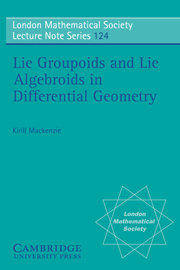Book contents
- Frontmatter
- Contents
- INTRODUCTION
- CHAPTER I The algebra of groupoids
- CHAPTER II Topological groupoids
- CHAPTER III Lie groupoids and Lie algebroids
- CHAPTER IV The cohomology of Lie algebroids
- CHAPTER V An obstruction to the Integrability of transitive Lie algebroids
- APPENDIX A On principal bundles and Atiyah sequences
- APPENDIX B On Lie groups and Lie algebras
- APPENDIX C On vector bundles
- REFERENCES
- INDEX
APPENDIX A - On principal bundles and Atiyah sequences
Published online by Cambridge University Press: 03 May 2010
- Frontmatter
- Contents
- INTRODUCTION
- CHAPTER I The algebra of groupoids
- CHAPTER II Topological groupoids
- CHAPTER III Lie groupoids and Lie algebroids
- CHAPTER IV The cohomology of Lie algebroids
- CHAPTER V An obstruction to the Integrability of transitive Lie algebroids
- APPENDIX A On principal bundles and Atiyah sequences
- APPENDIX B On Lie groups and Lie algebras
- APPENDIX C On vector bundles
- REFERENCES
- INDEX
Summary
This Appendix is an account of the Atiyah sequence of a principal bundle, and its use in the elementary aspects of connection theory. The Appendix is independent of the main text, and requires no knowledge of groupoids; it is assumed that the reader is familiar with the accounts of connections and their curvature forms in Kobayashi and Nomizu (1963) or Greub et al (1973).
What is now known as the Atiyah sequence of a principal bundle was first constructed by Atiyah (1957), and was, from the first, used to construct cohomological obstructions – originally to the existence of complex analytic connections. In the case of real differentiale bundles, it provides a neat encapsulation of the two definitions of a connection, and a conceptually clear and workable definition of the curvature form. These are the only points with which we are concerned here. Beyond this, the concept of Atiyah sequence – and its abstraction, the concept of transitive Lie algebroid – has a multiplicity of virtues; see Chapters III, IV and V.
The main purpose of this Appendix is to provide a lexicon for the correspondence between the infinitesimal connection theory of III§5 and the standard theory of connections in principal bundles. For this reason, most of this Appendix is devoted to establishing the correspondence between the Atiyah sequence formulation of connection theory and the standard theory; the actual definitions of connections and their curvature forms are extremely concise.
Information
- Type
- Chapter
- Information
- Lie Groupoids and Lie Algebroids in Differential Geometry , pp. 272 - 307Publisher: Cambridge University PressPrint publication year: 1987
